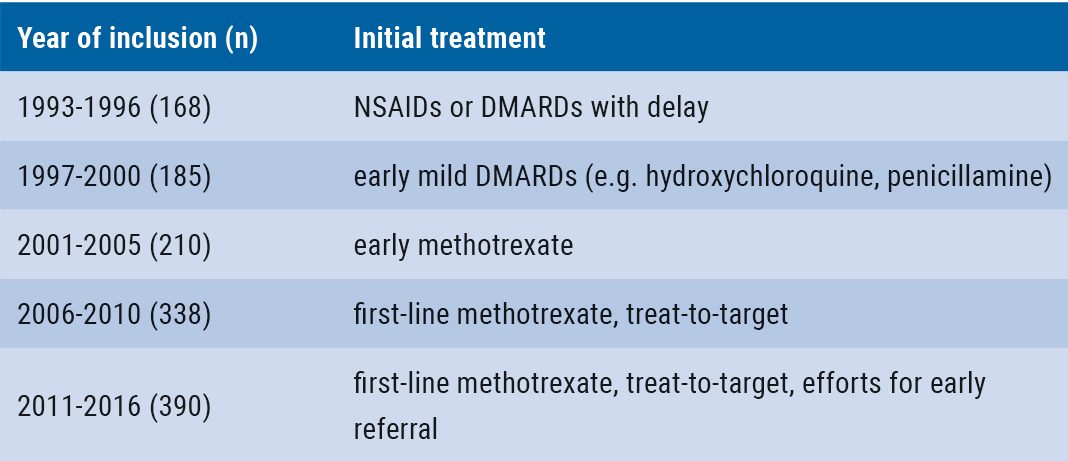Broadly speaking, RA consists of two distinct disease subtypes that are characterised by the presence or absence of RA-related auto-antibodies, of which the presence of anti-citrullinated protein antibodies (ACPA) is most specific for RA. Both subtypes have known differences in the severity of the disease course, and ACPA-positive and ACPA-negative RA may differ in their treatment responses. “What we all know, is that RA treatment has improved drastically with earlier treatment and better medication,” said Dr Xanthe Matthijssen (Leiden University Medical Center, the Netherlands). “However, the difference in treatment response between these two subtypes is still unclear and treatment guidelines do not make a clear distinction in RA treatment. Almost all start with methotrexate.”
Dr Matthijssen aimed to investigate the influence of advanced treatment strategies on disease activity, sustained drug-free remission, and functional disability over the last 25 years among ACPA-positive and ACPA-negative RA patients included in the Leiden Early Arthritis cohort. “We used inclusion period as an instrumental variable for treatment strategy,” added Dr Matthijssen. Patients were treated in routine care, and initial and subsequent treatment changed over time (see Table). Baseline age, gender, and antibody status were not significantly different between inclusion periods. Patient assessments included swollen joint counts, the 28-joint count DAS (DAS28-ESR), and health assessment questionnaires (HAQ). Sustained drug-free remission was defined as the persistent absence of synovitis after cessation of DMARD-therapy during all available follow-up (≥1 year).
Table: Treatment strategy in Leiden Early Arthritis cohort

With 1993-1996 as a reference, the DAS28-ESR decreased in the first year and remained lower in all inclusion periods (P<0.05). Drug-free remission was achieved faster in inclusion periods 2006-2010 and 2011-2016. Additionally, HAQ over time was lower in these last two periods. There was no difference in DAS28-ESR between ACPA-positive and ACPA-negative patients in subsequent cohorts. The increased rate of sustained drug-free remission was more prominent in ACPA-positive patients than ACPA-negative patients in inclusion periods 2006-2010 and 2011-2016. HAQ over time improved specifically in ACPA-positive RA. In general, “ACPA-positive RA patients benefited a lot, whereas ACPA-negative RA patients benefited a little. Further improvements are needed for ACPA-negative RA patients,” concluded Dr Matthijssen. It is likely that the extreme immunological heterogeneity within the ACPA-negative group and overlaps with inflammatory hand osteoarthritis and other factors account for these differences [2].
- Matthijssen X, et al. Abstract OP0023. EULAR 2019.
- McGonagle D, et al. Autoimmun Rev. 2018 Nov;17(11):1115-1123.
Posted on
Previous Article
« Treat-to-target approach emerging in axial spondyloarthritis Next Article
What is new in osteoarthritis »
« Treat-to-target approach emerging in axial spondyloarthritis Next Article
What is new in osteoarthritis »
Table of Contents: EULAR 2019
Featured articles
Efficacy and safety of ixekizumab versus adalimumab in patients with PsA
Rheumatoid Arthritis
Cohort study shows improvement during 25 years of RA treatment
Filgotinib in RA patients with inadequate response or naïve to methotrexate
Clinical effectiveness of fenebrutinib in RA patients with methotrexate or TNFi failure
Short methotrexate stop is safe in patients with RA
Tofacitinib is safe according to real-world data analysis
Tapering of prednisone in RA patients who achieved low disease activity or remission with tocilizumab
Efficacy and safety of E6011 in RA patients with inadequate response to methotrexate
Preliminary efficacy and safety data of RG6125 in RA patients with an inadequate response to TNF inhibitors
Integrated 10-year analysis confirms safety profile abatacept
Switching among multiple infliximab biosimilars does not cause immunogenicity
Switch to sarilumab from adalimumab is efficacious and safe
Axial Spondyloarthritis
Treat-to-target approach emerging in axial spondyloarthritis
NSAIDs consumption is linked to patient-assessed disease activity and decreases with use of TNF inhibitors
Psoriatic Arthritis
Efficacy and safety of ixekizumab versus adalimumab in patients with PsA
Efficacy and safety of bimekizumab in patients with active PsA
Filgotinib is efficacious and safe in PsA
Ixekizumab improves signs and symptoms in TNFi-naïve PsA patients
Etanercept and methotrexate as first-line treatment in PsA
Unacceptable pain is common in patients with psoriatic arthritis
Osteoarthritis and Osteoporosis
Miscellaneous
Interstitial lung disease in rheumatic diseases and systemic sclerosis
Emapalumab in patients with macrophage activation syndrome
Support for tocilizumab use in giant cell arteritis
Related Articles
September 4, 2019
Emapalumab in patients with macrophage activation syndrome

September 4, 2019
Integrated 10-year analysis confirms safety profile abatacept
© 2024 Medicom Medical Publishers. All rights reserved. Terms and Conditions | Privacy Policy
HEAD OFFICE
Laarderhoogtweg 25
1101 EB Amsterdam
The Netherlands
T: +31 85 4012 560
E: publishers@medicom-publishers.com

